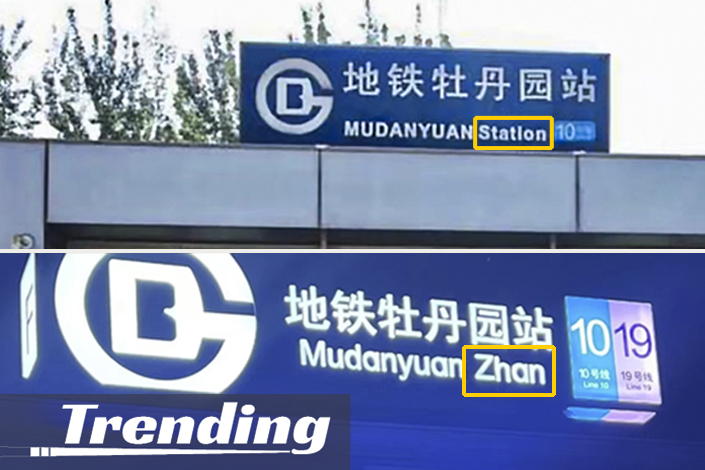
What’s trending?
Beijing residents have noticed that the capital’s subway has been replacing the English word “station” with the Chinese Romanization (pinyin) “zhan.” The change, implemented at several stops already, has triggered much discussion online, with some believing it will confuse overseas visitors.
On Saturday, Beijing Subway responded saying that the city had unified its translation standards for subway stations in accordance with related regulations.
As of Thursday, the hashtag #Authorities respond to the launch of new translation standards at Beijing subway stations (官方回应北京地铁站启用翻译新标准) has received more than 8 million views on China’s Twitter-like microblogging platform Weibo.
What’s the story?
The name changes were spotted as early as Dec. 23, when an internet user asked Beijing Subway on Weibo whether its staff could change the word “zhan” on a station sign back to “station.” “Who can understand it? It will only mislead passengers who do not understand Chinese,” the user said.
The new names have been prescribed by state rules, including regulations on the administration of geographical names, the subway operator said, adding that they are already in use at some stations.
Some people suggested that after adopting the new standards, the names of Beijing’s subway stations will be written totally in pinyin, while station names may need a note after the pinyin that gives a translation into English.
According to photos and videos circulating online, subway stations including Weigongcun and Mudanyuan in Haidian district, as well as Beixinqiao in Dongcheng district, have had their names changed.
Caixin noticed that the translations of Chaoyang Park Station and Tuanjiehu Station in Chaoyang district have not been replaced.
Beijing has adjusted its way of translating subway stations several times. In 2006, the city issued a set of general principles for English translations on bilingual public signs, which required all subway station names to be capitalized.
Since 2018, with the opening of more subway lines, the city adopted a new set of standards that required the initial of each word of a name to be capitalized, state-run Xinhua News Agency reported. Station names in pinyin were to be written out as pronounced, in combined syllables. For example, the station XIHUANGCUN was changed to XiHuang Cun.


What are people saying online?
A supporter of the change said as it’s required by the state, “We should have cultural self-confidence.”
However, other social media users questioned this. One said, “Is it necessary? Real self-confidence is tolerance and grandeur, not deliberate display.”
Some believed the new translations will confuse foreigners. One comment read, “The word ‘zhan’ has seriously affected foreigners’ identification of rail transit stations.”
Another comment says, “Aren’t road signs for guidance? No matter how they are translated, the most important thing is to make them easy to use.”
One social media user laughed at the change when commenting on a related tweet from Sixth Tone. “Now it’s not a translation anymore, it’s just pinyin, and pinyin without even the proper tone marks. What can possibly be more stupid and pointless than this?”
“The Beijing subway is really boring. The translation of [dull] signs has changed, but not the [dull] voiceovers,” another user said.
On Tuesday, Guangming Daily weighed in on the issue. “The purpose of translation is to communicate…Changing XX Station to XX Zhan may fall into a situation: Chinese people don’t need it and foreigners don’t understand it. Whether it’s translation or phonetic notation is a little vague.”
“We are in an era of irreversible globalization, and personnel exchanges are already a rigid need. How to add convenient facilities and signs, and how to unify standards, all need to be considered,” the newspaper said, adding that it’s necessary to discuss these issues ahead of the 2022 Beijing Winter Olympics, during which “domestic and foreign exchanges will certainly usher in a peak” and Beijing will be closely watched by the international community.
Contact reporter Wang Xintong (xintongwang@caixin.com) and editor Heather Mowbray (heathermowbray@caixin.com)
Get our weekly free Must-Read newsletter.







